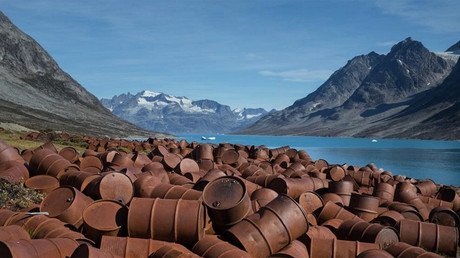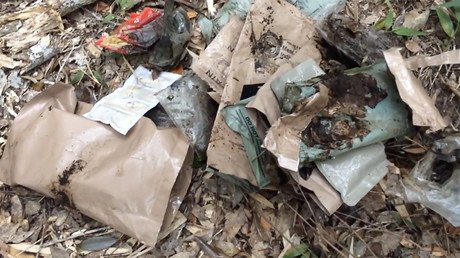UK man sues US Army after being unknowingly exposed to toxic dust in their German base
A defiant UK worker who was unknowingly exposed to toxic carcinogenic dust at a US Army base in Germany told RT how his employers’ reluctance to cover medical check-ups made him fight for justice and take the Army to court.
David Wright Patterson, a British man who said he was exposed to cadmium dust – a substance that could cause cancer if inhaled – at the US Army camp in Dulmen, Germany, told RT that workers were given no protective gear and wear while he oversaw the cleaning of 50 boxes of contaminated equipment for ten days back in 2017. Even more, it took over a year before the army sent a formal notice saying the boxes they were working on were contaminated.
“On inspection we found powder, very-very fine dust powder,” Paterson recalled. “When we opened it up, it became airborne. So in a couple of minutes, from head to feet, I was covered with this white powder, a bit like talcum powder.”
Several days later, he continued, he and his team were invited to another warehouse where they were told to clean the boxes “from top to bottom, inside out.” And that is how they started cleaning the packaging “without any training or information, without any knowledge of the danger.”
Almost a year after, in March 2018, Paterson received some paper saying the equipment he was working on was covered by a hazardous substance. “In this paperwork it said: ‘Do not touch, do not go near, do not prepare or clean this equipment without any safety measures, masks, gloves’.” The notification had clearly said it was cadmium dust, a carcinogenic, Paterson explained.
Anxious, he investigated the matter only to found out the warning referred to the same equipment he dealt with. “We knew nothing, they knew nothing … There was no information coming from my superiors, my employers – nothing until we did a full investigation.”
Paterson was employed by a UK-based recruiting firm M&E Global which has a contract with URS AECOM, a subcontractor for US Army.
What struck him afterwards was the army’s failure to notify workers of life-threatening conditions they found themselves in. “This was the first time we got information on what we were dealing with and what we were touching. One year after we’d cleaned the boxes!” Paterson said.
After the notification landed on his desk, the man consistently tried to raise matters with his bosses, but his requests hit their deaf ears. “Their initial reaction… I couldn’t believe it. I have it in black-and-white. Their reaction was: ‘Yeah… well… whatever… we’ll get back to you’,” Paterson revealed. “I have to chase them on daily [basis] and ask what happened.”
Earlier this year, the US military acknowledged the workers were exposed to cadmium dust but said the items were “incorrectly cleaned in a single section of a single warehouse by eight employees,”according to Col. Sean Kuester, commander for US Army Garrison Benelux.
The northwestern city of Duelmen is home to Tower Barracks, a former British military facility that was taken over by US Army Europe in 2016. While large in size, the compound has no doctor or paramedic, according to Paterson, who said he was sacked by M&E for blowing the whistle. “I asked them for assistance – they ignored me. I asked them advice on how to get to a specialist doctor about this carcinogenic powder that could be inside our lungs – not interested,” the worker added.
“They told me: ‘Whatever, go find a doctor and speak to your employer’.” Paterson had to take care of his health independently. He paid for a doctor and covered expenses for blood and lung tests completely on his own. What he expected US Army to do is arranging a full medical background check and medical assistance, Paterson told.
RT has reached M&E Global as well as AECOM and US Army Garrison Benelux, asking them to provide their take on the story, but received no response at the time of publication of this article.
Subscribe to RT newsletter to get stories the mainstream media won’t tell you.
















